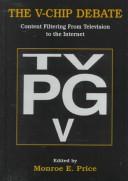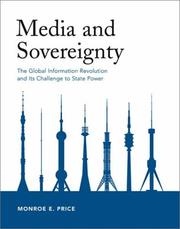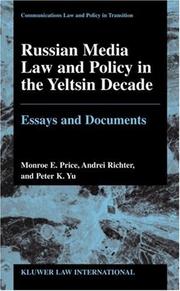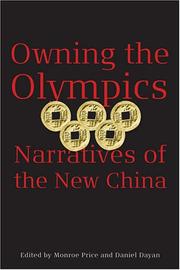| Listing 1 - 10 of 25 | << page >> |
Sort by
|

ISBN: 0805830626 Year: 1998 Publisher: Mahwah Erlbaum
Abstract | Keywords | Export | Availability | Bookmark
 Loading...
Loading...Choose an application
- Reference Manager
- EndNote
- RefWorks (Direct export to RefWorks)
Mass communications --- #SBIB:AANKOOP --- #SBIB:309H1514 --- Radio- en/of televisie: politieke, juridische, ethische, ideologische aspecten (bv.censuur) --- Television programs --- V-chips. --- Violence on television. --- Rating. --- V-chips --- Violence on television --- Television violence --- TV violence --- Violence in television --- Television --- Violence chips --- Program rating, Television --- Television broadcasting --- Television program rating --- Rating --- Receivers and reception --- Censorship --- Audience reaction --- Program rating

ISBN: 0198183380 0198183623 Year: 1995 Publisher: Oxford Oxford university press
Abstract | Keywords | Export | Availability | Bookmark
 Loading...
Loading...Choose an application
- Reference Manager
- EndNote
- RefWorks (Direct export to RefWorks)
Economic policy and planning (general) --- Sociology of cultural policy --- Mass communications --- Interêt public --- Radiotélédiffusion, Politique de la --- -Broadcasting policy --- -Pressure groups --- -Public interest --- Radio- en/of televisie: politieke, juridische, ethische, ideologische aspecten (bv.censuur) --- Télédiffusion --- Interêt public --- Radiotélédiffusion, Politique de la --- Broadcasting policy --- Democracy --- Pressure groups --- Public interest --- Television broadcasting --- Groupes de pression --- Démocratie --- Télévision --- #SBIB:309H1016 --- #SBIB:309H1514 --- Self-government --- Political science --- Equality --- Representative government and representation --- Republics --- Broadcasting --- Broadcasting and state --- Mass media policy --- State, The --- Common good --- Advocacy groups --- Interest groups --- Political interest groups --- Special interest groups (Pressure groups) --- Functional representation --- Lobbying --- Policy networks --- Political action committees --- Social control --- Media: socio-culturele aspecten (massamedia en maatschappij, met inbegrip van cultuurhistorische werken en werken over de maatschappelijke en politieke effecten van de (diverse) media) --- Government policy

ISBN: 0262281902 0585448493 9780262281904 9780585448497 0262162113 9780262162111 Year: 2002 Publisher: Cambridge, Mass. MIT Press
Abstract | Keywords | Export | Availability | Bookmark
 Loading...
Loading...Choose an application
- Reference Manager
- EndNote
- RefWorks (Direct export to RefWorks)
Media have been central to government efforts to reinforce sovereignty and define national identity, but globalization is fundamentally altering media practices, institutions, and content. More than the activities of large conglomerates, globalization entails competition among states as well as private entities to dominate the world's consciousness. Changes in formal and informal rules, in addition to technological innovation, affect the growth and survival or decline of governments.In Media and Sovereignty, Monroe Price focuses on emerging foreign policies that govern media in a world where war has information as well as military fronts. Price asks how the state, in the face of institutional and technological change, controls the forms of information reaching its citizens. He also provides a framework for analyzing the techniques used by states to influence populations in other states. Price draws on an international array of examples of regulation of media for political ends, including "self-regulation," media regulation in conflict zones, the control of harmful and illegal content, and the use of foreign aid to alter media in target societies.
Mass media --- Government information. --- Freedom of information. --- Sovereignty. --- Globalization. --- Government information --- Freedom of information --- Sovereignty --- Globalization --- Law, General & Comparative --- Law, Politics & Government --- Law and legislation. --- Law and legislation --- Global cities --- Globalisation --- Internationalization --- State sovereignty (International relations) --- Information, Freedom of --- Liberty of information --- Right to know --- Information, Government --- International relations --- Anti-globalization movement --- International law --- Political science --- Common heritage of mankind (International law) --- Self-determination, National --- Civil rights --- Freedom of speech --- Intellectual freedom --- Telecommunication --- Public records --- ECONOMICS/General --- SOCIAL SCIENCES/Media Studies
Book
ISBN: 1316191524 1316189686 113968048X 1107072514 1107420938 Year: 2015 Publisher: Cambridge : Cambridge University Press,
Abstract | Keywords | Export | Availability | Bookmark
 Loading...
Loading...Choose an application
- Reference Manager
- EndNote
- RefWorks (Direct export to RefWorks)
Vast changes in technologies and geopolitics have produced a wholesale shift in the way states and other powerful entities think about the production and retention of popular loyalties. Strategic communication has embraced these changes as stakes increase and the techniques of information management become more pervasive. These shifts in strategic communications impact free speech as major players, in a global context, rhetorically embrace a world of transparency, all the while increasing surveillance and modes of control, turning altered media technologies and traditional media doctrines to their advantage. This book exposes the anxieties of loss of control, on the one hand, and the missed opportunities for greater freedom, on the other. 'New' strategic communication arises from the vast torrents of information that cross borders and uproot old forms of regulation. Not only states but also corporations, nongovernmental organizations, religious institutions, and others have become part of this new constellation of speakers and audiences.
Freedom of expression. --- Telecommunication --- Globalization. --- Geopolitics. --- World politics --- Global cities --- Globalisation --- Internationalization --- International relations --- Anti-globalization movement --- Freedom of information --- Trade regulation --- Expression, Freedom of --- Free expression --- Liberty of expression --- Civil rights --- Law and legislation.

ISBN: 9041188770 Year: 2002 Publisher: The Hague : Kluwer law international,
Abstract | Keywords | Export | Availability | Bookmark
 Loading...
Loading...Choose an application
- Reference Manager
- EndNote
- RefWorks (Direct export to RefWorks)
Freedom of the press --- Mass media policy --- Mass media --- Press law --- History --- Law and legislation --- History --- History
Book
ISBN: 9789633864623 Year: 2009 Publisher: Budapest New York
Abstract | Keywords | Export | Availability | Bookmark
 Loading...
Loading...Choose an application
- Reference Manager
- EndNote
- RefWorks (Direct export to RefWorks)
Book
ISBN: 9781107420939 9781139680486 9781107072510 Year: 2015 Publisher: Cambridge Cambridge University Press
Abstract | Keywords | Export | Availability | Bookmark
 Loading...
Loading...Choose an application
- Reference Manager
- EndNote
- RefWorks (Direct export to RefWorks)
Communication --- Communication internationale --- Informatique et liberté --- Médias et mondialisation --- Droit et mondialisation
Digital
ISBN: 9789633864623 Year: 2009 Publisher: Budapest ;; New York Central European University Press
Abstract | Keywords | Export | Availability | Bookmark
 Loading...
Loading...Choose an application
- Reference Manager
- EndNote
- RefWorks (Direct export to RefWorks)

ISBN: 0472900498 9780472900497 9780472024506 0472024507 9780472070329 0472070320 9780472050321 047205032X 9786613769497 1280997885 Year: 2008 Publisher: Ann Arbor : University of Michigan Press,
Abstract | Keywords | Export | Availability | Bookmark
 Loading...
Loading...Choose an application
- Reference Manager
- EndNote
- RefWorks (Direct export to RefWorks)
A major contribution to the study of global events in times of global media. Owning the Olympics tests the possibilities and limits of the concept of 'media events' by analyzing the mega-event of the information age: the Beijing Olympics. . . . A good read from cover to cover." —Guobin Yang, Associate Professor, Asian/Middle Eastern Cultures & Sociology, Barnard College, Columbia University From the moment they were announced, the Beijing Games were a major media event and the focus of intense scrutiny and speculation. In contrast to earlier such events, however, the Beijing Games are also unfolding in a newly volatile global media environment that is no longer monopolized by broadcast media. The dramatic expansion of media outlets and the growth of mobile communications technology have changed the nature of media events, making it significantly more difficult to regulate them or control their meaning. This volatility is reflected in the multiple, well-publicized controversies characterizing the run-up to Beijing 2008. According to many Western commentators, the People's Republic of China seized the Olympics as an opportunity to reinvent itself as the "New China"---a global leader in economics, technology, and environmental issues, with an improving human-rights record. But China's maneuverings have also been hotly contested by diverse global voices, including prominent human-rights advocates, all seeking to displace the official story of the Games. Bringing together a distinguished group of scholars from Chinese studies, human rights, media studies, law, and other fields, Owning the Olympics reveals how multiple entities---including the Chinese Communist Party itself---seek to influence and control the narratives through which the Beijing Games will be understood.
Olympics --- Political aspects. --- China --- Olympic games. --- Mass media. --- Cina --- Kinë --- Cathay --- Chinese National Government --- Chung-kuo kuo min cheng fu --- Republic of China (1912-1949) --- Kuo min cheng fu (China : 1912-1949) --- Chung-hua min kuo (1912-1949) --- Kina (China) --- National Government (1912-1949) --- China (Republic : 1912-1949) --- People's Republic of China --- Chinese People's Republic --- Chung-hua jen min kung ho kuo --- Central People's Government of Communist China --- Chung yang jen min cheng fu --- Chung-hua chung yang jen min kung ho kuo --- Central Government of the People's Republic of China --- Zhonghua Renmin Gongheguo --- Zhong hua ren min gong he guo --- Kitaĭskai︠a︡ Narodnai︠a︡ Respublika --- Činská lidová republika --- RRT --- Republik Rakjat Tiongkok --- KNR --- Kytaĭsʹka Narodna Respublika --- Jumhūriyat al-Ṣīn al-Shaʻbīyah --- RRC --- Kitaĭ --- Kínai Népköztársaság --- Chūka Jinmin Kyōwakoku --- Erets Sin --- Sin --- Sāthāranarat Prachāchon Čhīn --- P.R. China --- PR China --- Chung-kuo --- Zhongguo --- Zhonghuaminguo (1912-1949) --- Zhong guo --- Chine --- République Populaire de Chine --- República Popular China --- Catay --- VR China --- VRChina --- 中國 --- 中国 --- 中华人民共和国 --- Jhongguó --- Bu̇gu̇de Nayiramdaxu Dundadu Arad Ulus --- Bu̇gu̇de Nayiramdaqu Dumdadu Arad Ulus --- Bu̇gd Naĭramdakh Dundad Ard Uls --- Khi︠a︡tad --- Kitad --- Dumdadu Ulus --- Dumdad Uls --- Думдад Улс --- Kitajska --- China (Republic : 1949- ) --- PRC --- P.R.C. --- BNKhAU --- БНХАУ --- Mass media -- China. --- Olympic Games -- (29th : -- 2008 : -- Beijing, China). --- Olympics -- Political aspects -- China. --- Mass media --- Social Sciences --- Recreation & Sports --- Political aspects --- Games, Olympic --- Olympic games --- Summer Olympics --- Sports --- Olympic Games
Book
ISBN: 3319759876 3319759868 Year: 2018 Publisher: Cham : Springer International Publishing : Imprint: Palgrave Macmillan,
Abstract | Keywords | Export | Availability | Bookmark
 Loading...
Loading...Choose an application
- Reference Manager
- EndNote
- RefWorks (Direct export to RefWorks)
Visual Imagery and Human Rights Practice examines the interplay between images and human rights, addressing how, when, and to what ends visuals are becoming a more central means through which human rights claims receive recognition and restitution. The collection argues that accounting for how images work on their own terms is an ever more important epistemological project for fostering the imaginative scope of human rights and its purchase on reality. Interdisciplinary in nature, this timely volume brings together voices of scholars and practitioners from around the world, making a valuable contribution to the study of media and human rights while tackling the growing role of visuals across cultural, social, political and legal structures.
Human rights in mass media. --- Mass media --- Culture. --- Communication. --- Global/International Culture. --- Media and Communication. --- Development Communication. --- Communication, Primitive --- Mass communication --- Sociology --- Cultural sociology --- Culture --- Sociology of culture --- Civilization --- Popular culture --- Social aspects
| Listing 1 - 10 of 25 | << page >> |
Sort by
|

 Search
Search Feedback
Feedback About UniCat
About UniCat  Help
Help News
News